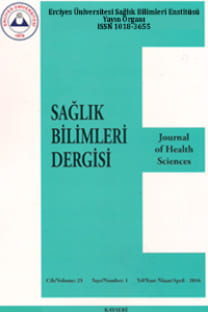TÜRKIYE’DE MANISA VE YÖRESINDE AKRABA EVLILIĞI YAPMIŞ AILELERDE GJB2 (CONNEXIN 26) GENINDEKI35DEL MUTASYONUNUN ARAŞTIRILMASI
Günümüze kadar tüm popülasyonlarda yapılan çalışmalarda Connexin 26 (GJB2 ) genindeki mutasyonlar non sendromik otozomal resesif konjenital işitme kaybında önemli bir yere sahiptir. Connexin 26 geni ve mutasyon tipleriyle ilişkilendirilen işitme kaybını belirlemek için Türkiye’de Manisa ve yöresinde yaşayan 8 nonsendromik işitme kayıplı birey, akraba evliliği yapmış 14 aile (evli çiftler) çalışmaya alınmıştır. 35delG mutasyonları polimeraz zincir reaksiyonu (PZR) ve kompetitif amplifikasyon refrakter mutasyon sistemi (C-ARMS) ile belirlenmiştir. Yedi hasta 35delG mutasyonu için homozigot, bir hasta heterozigot olarak saptanmıştır. Sonuçlarımız, Türkiye’de Manisa ve çevresindeki hastalarda non sendromik konjenital işitme kaybına Connexin 26 genindeki 35delG mutasyonunun neden olduğunu ortaya koymuştur
Anahtar Kelimeler:
35 delG, connexin 26, GBJ2, otosomal resesif non-sendromik işitme kaybı
INVESTIGATION OF THE 35delG MUTATION IN THE GJB2 (CONNEXIN 26) GENE-RELATED FAMILY IN MANISA AND VICINITY IN TURKEY
Mutations in connexin 26 gene (GJB2) lead to a significant proportion of non-syndromic autosomal recessive congenital hearing loss in all populations studied so far. Eight patients with nonsyndromic hearing loss out of 14 related family (marriage couple) were screened to determine hearing loss attributed to connexin 26 gene and the types of mutations living in Manisa and vicinity, Turkey. The 35delG mutations were detected by Polymerase Chain Reaction (PCR) with Competitive Amplification Refractory Mutation System (CARMS). Seven patients were detected as homozygous for the 35delG mutation and one patient detected as heterozygous. Our results indicate that 35delG mutation in the connexin 26 gene was the cause of non-syndromic congenital hearing loss of the patients in Manisa and vicinity in Turkey
___
- 1. Mukherjee M, Phadke SR, Mittal B , Connexin 26 and autosomal recessive nonsyndromic hearing loss. Indian Journal of Human Genetics 2003; 9: 40-50.
- 2. Schrijver I. Hereditary nonsyndromic sensorineural hearing loss: transforming silence to sound.J Mol Diagn. 2004;6:275– 284.
- 3. Yilmaz A, Menevse S, Bayazit Y ,et al. Two novel missense mutations in the Connexin 26 gene in Turkish patients with Nonsyndromic Hearing Loss. Biochem Genet 2010;48:248– 256.
- 4. Ay J, Rasool TJ. High frequency of connexin26 (GJB2) mutations associated with nonsyndromic hearing loss in the population of Kerala, India. Int J Pediatr Otorhinolaryngol. 2009;73:437-43.
- 5. Miller SA, Dykes DD, Polesky HF. A simple salting out procedure for extracting DNA from human nucleated cells. Nucleic Acides Research 1988;16:1215.
- 6. Zelante L, Gasparini P, Estivill X, Melchionda S, D'Agruma L, Govea N, Mila M, Monica, M.D, Lutfi J. Connexin26 mutations associated with the most common form of non -syndromic neurosensory autosomal recessive deafness (DFNB1) in Mediterraneans. Hum. Mol. Genet. 1997;6:1605-1609.
- 7. Kalay E, Caylan R, Kremer H, de Brouwer APM, Karaguzel A. GJB2 mutations in Turkish patients with ARNSHL: prevalence and two novel mutations. Hear Res. 2005;203:88- 93.
- 8. Baris I, Kilinc MO, Tolun A. Frequency of the 35delG mutation in the connexin 26 gene in Turkish hearing-impaired patients. Clin Genet. 2001;60:452-5.
- 9. Bayazit YA, Cable BB, Cataloluk O. GJB2 gene mutations causing familial hereditary deafness in Turkey. Int J Pediatr Otorhinolaryngol. 2003;67:1331-5.
- 10. Balci B, Gerceker FO, Aksoy S, et al. Identification of an ancestral haplotype of the 35delG mutation in the GJB2 (connexin 26) gene responsible for autosomal recessive non -syndromic hearing loss in families from the Eastern Black Sea Region in Turkey. Turk J Pediatr. 2005;47:213-21.
- 11. Fisioğlu H. Consanguineous marriage and marital adjustment in Turkey. The Family. Journal . 2001;9:215-222. 12. Baki A, Karagüzel A,Beşer E. Consanguineous marriages in the province of Trabzon. East African Medical Journal.1992;69:294-96.
- ISSN: 1018-3655
- Yayın Aralığı: Yılda 3 Sayı
- Başlangıç: 1993
- Yayıncı: Prof.Dr. Aykut ÖZDARENDELİ
Sayıdaki Diğer Makaleler
Nuray ALTINTAŞ, Ali Vefa YÜCETÜRK, Seda ÖRENAY
YENİDOĞAN ÜNİTELERİNİN DÜZEYLERİ VE ORGANİZASYONU
Sebahat Altundağ DÜNDAR, Meral BAYAT, Emine ERDEM
VETERİNER HEKİMLİĞİ YÖNÜYLE MEHMET AKİF ERSOY
Çağrı Çağlar SİNMEZ, Aşkın YAŞAR
GALVANO SERAMİK VE METAL SERAMİK ÜÇ ÜYELİ KÖPRÜ PROTEZLERİNİN KIRILMA DİRENÇLERİNİN İNCELENMESİ
Zekiye EROĞLU, Ayşegül Güleryüz GÜRBULAK
Vehbi GÜNEŞ, Murat KİBAR, Ali Cesur ONMAZ, Gültekin ATALAN
2011 YILI MEZUNLARI TEZ ÖZETLERİ (II)
Kanşad PALA, Salih DOĞAN, Özgür ER
GIARDIOSIS’Lİ KÖPEKLERDE HEMATOLOJİK VE BİYOKİMYASAL GÖSTERGELERİN DEĞERLENDİRİLMESİ
